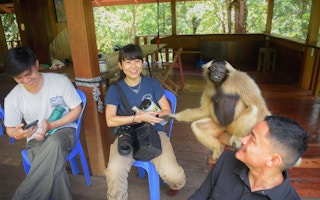The National University of Singapore has hired environment journalist Audrey Tan to lead a new science communications team for its two research institutes – the Centre for Nature-based Climate Solutions (CNCS) and the Tropical Marine Science Institute (TMSI).
To continue reading, subscribe to Eco‑Business.
There's something for everyone. We offer a range of subscription plans.
- Access our stories and receive our Insights Weekly newsletter with the free EB Member plan.
- Unlock unlimited access to our content and archive with EB Circle.
- Publish your content with EB Premium.
Tan, who won her news organisation’s Journalist of the Year award in 2021, will be leaving her roles as science and environment correspondent and assistant news editor at The Straits Times, Singapore’s English-language news daily. She has been covering the environment beat for almost a decade.
Tan told Eco-Business that she will miss journalism, but that her new role as science communications and outreach lead for the research institutes will also involve engaging the public on important climate and environmental issues, albeit in different ways. This includes looking at how to “make science pop beyond the pages of scientific journals”, said Tan.
At a time when nature-based climate solutions are gaining policy momentum and when related research are starting to have regional and global implications, the new science communications team that Tan is helping to build aims to amplify the work of researchers at the two institutes.
“In my new role, I hope to raise the profile of Singaporean and Southeast Asian scientific expertise globally. Public interest and appetite for nature-based solutions are growing, and many eyes are now turning to Southeast Asia for our bounty of nature. We have the ability and expertise to speak about this region, from this region,” she said.
The appointment will be effective from 25 October.
Both CNCS and TMSI are helmed by conservation scientist Koh Lian Pin.
Set up in 2020, CNCS explores deploying nature – including forests and mangroves – to reduce greenhouse gas emissions and mitigate climate change impacts. The latest Intergovernmental Panel for Climate Change (IPCC) report lists nature-based solutions as one of the antidotes that will keep climate change in check.
Koh said that he hopes that the new science communications team that Tan will help to develop and oversee can mobilise understanding on climate change and build “sustained, committed support for action and solutions to solve the climate crisis”. The team will be focused on generating high-quality, accessible, innovative and engaging content and material to translate science and research to various audiences across a range of media platforms, Koh said.
“Audrey has deep and extensive expertise in scientific communication, with an innate and instinctive ability to translate technical scientific topics in ways that are easily digestible by the general public. She brings with her an exceptional combination of creativity, drive and passion for the environment that we believe will be instrumental for enabling the change we need for a better world,” said Koh.
Reflecting on her years devoted to writing and reporting on the environment, Tan said that she has seen first-hand how interest in the beat has grown in Singapore. “It is encouraging to see how things have changed. There is more political will to tackle climate change and conserve nature – we see Singapore clamping down on illegal wildlife trade and implementing stricter laws to protect native wildlife, and there is also greater consideration of connectivity in development projects. However, there is still room for improvement on many fronts.”
Tan sits on the Pulitzer Center’s advisory committee for the Southeast Asia Rainforest Journalism Fund. She is now working on her final reporting project at The Straits Times, supported by the fund. It will feature Southeast Asia’s ‘Silent Forests’ and is due to be published at the end of October.














